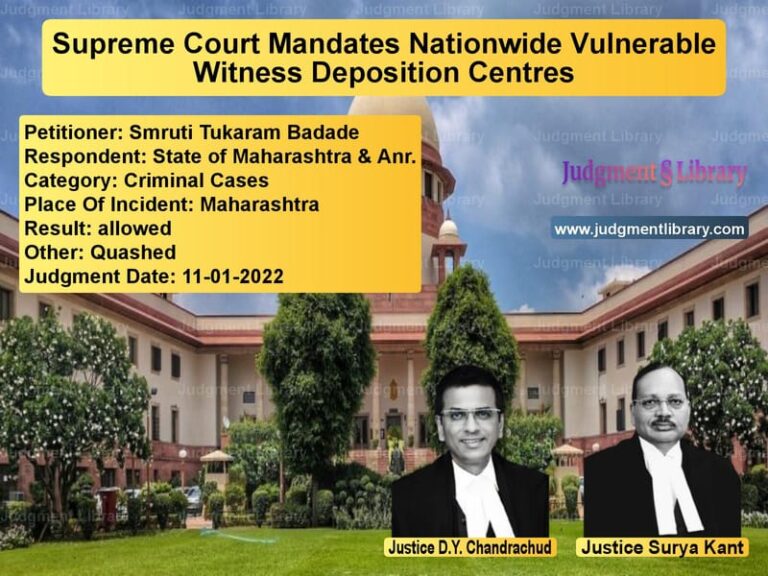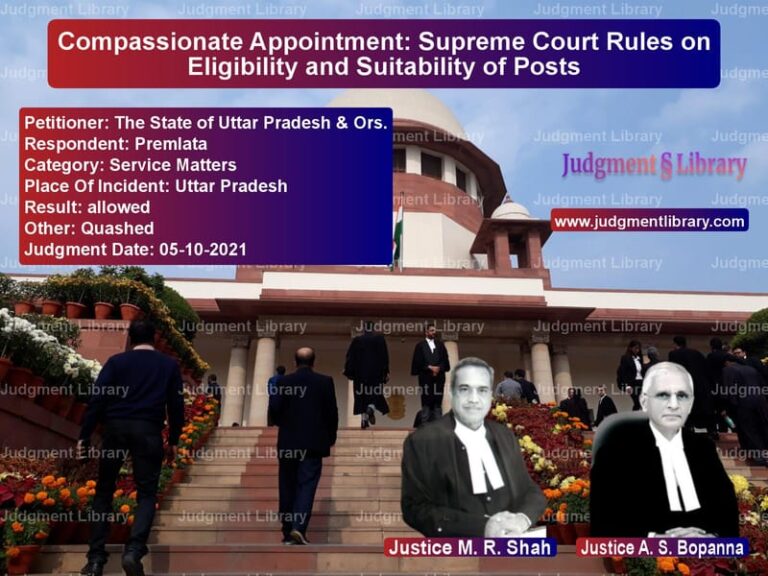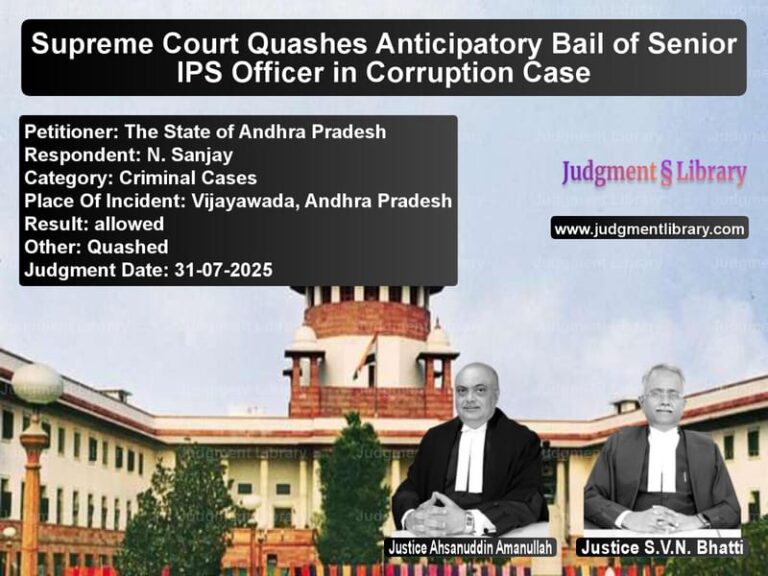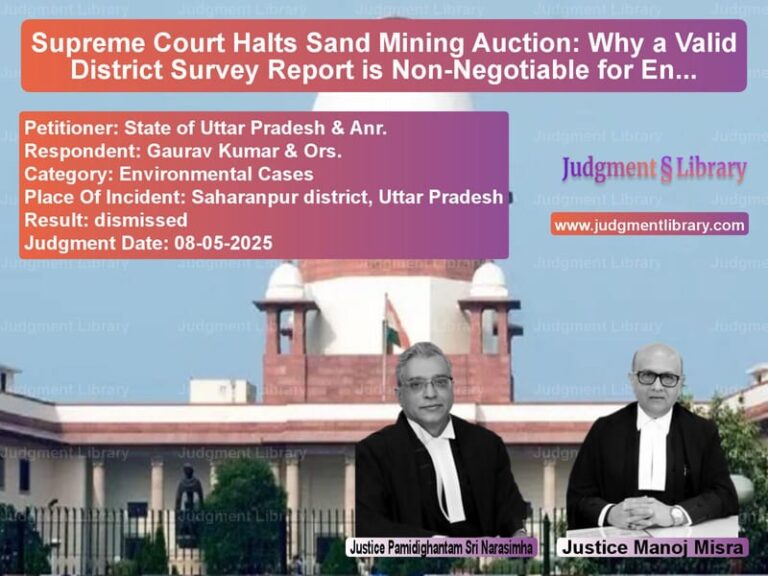Krishna Devi vs. Keshri Nandan: Supreme Court Upholds Sale Deed in Property Dispute
The case of Krishna Devi vs. Keshri Nandan revolves around a family property dispute, where the appellant, Krishna Devi, sought partition and separate possession of half share in the property inherited from her grandfather, Banshi Dhar. The primary issue at hand was the validity of a sale deed executed by her father, Dharam Singh, in favor of the respondent, Keshri Nandan. The appellant claimed that the sale deed was obtained through fraud and misrepresentation, making it invalid. The case ultimately reached the Supreme Court for resolution.
Background of the Case
Krishna Devi, the daughter of Dharam Singh, filed a suit in 1992 against Keshri Nandan and Mathura Prasad, the defendants, for partition and separate possession of half share in a property that originally belonged to her grandfather. After the death of her father, Krishna Devi believed she was entitled to her father’s share. However, the defendants contended that Dharam Singh had already executed a sale deed in favor of Keshri Nandan, transferring his fifty percent share in the property. Krishna Devi challenged the sale deed, asserting that it was obtained fraudulently.
The trial court ruled in favor of Krishna Devi, stating that the sale deed was not valid and that it did not confer any rights to the defendants. The defendants appealed the decision, and the appellate court ruled in their favor. Subsequently, the High Court dismissed Krishna Devi’s second appeal, leading to her filing an appeal in the Supreme Court.
Key Arguments
Petitioner’s Argument (Krishna Devi)
- Krishna Devi argued that the sale deed executed by her father, Dharam Singh, was obtained by fraud and misrepresentation.
- She claimed that her father had been ill and was not in a sound state of mind when he signed the sale deed, rendering it invalid.
- She contended that the sale deed should not be binding upon her as she was entitled to a half share in the property after her father’s death.
Respondent’s Argument (Keshri Nandan)
- Keshri Nandan contended that the sale deed was executed by Dharam Singh while he was in a sound state of mind, and it was done voluntarily.
- The respondent pointed to the evidence of the Sub-Registrar, who testified that Dharam Singh was aware of the contents of the sale deed before it was executed and that the document was attested by witnesses who confirmed his mental clarity.
- He argued that there was no medical evidence to support the claim that Dharam Singh was unwell at the time of executing the sale deed, and therefore, the sale deed was valid.
Supreme Court’s Judgment
The Supreme Court, comprising Justices N.V. Ramana and S. Abdul Nazeer, reviewed the case and made the following observations:
1. The Validity of the Sale Deed
The court emphasized that the validity of the sale deed hinged on the mental state of Dharam Singh at the time of execution. The court noted that the Sub-Registrar, who registered the sale deed, had testified that Dharam Singh was fully aware of the contents of the document before signing it. Furthermore, the attesting witnesses did not testify to any concerns about his mental state.
2. Lack of Medical Evidence
The court observed that although the appellant claimed her father was ill, no medical evidence was presented to substantiate this claim. The absence of medical records or any corroborative evidence led the court to conclude that there was no basis for questioning Dharam Singh’s mental capacity at the time of signing the sale deed.
3. Fraud and Misrepresentation
The court dismissed the appellant’s argument of fraud and misrepresentation, stating that the evidence did not support the claim that the sale deed was obtained through fraudulent means. The court found no evidence to suggest that the respondent had acted dishonestly in the execution of the sale deed.
4. Upholding the High Court’s Judgment
The Supreme Court agreed with the High Court’s conclusion, stating that the sale deed executed by Dharam Singh was legally valid and binding. The court found no merit in the appeal and upheld the decision of the lower courts.
Conclusion
The Supreme Court’s ruling reaffirmed the validity of the sale deed executed by Dharam Singh and upheld the defendants’ claim to the property. The court emphasized the importance of presenting clear and convincing evidence in cases involving allegations of fraud and mental incapacity. The absence of medical evidence and the lack of any substantial proof of misrepresentation led to the dismissal of the appeal.
Petitioner Name: Krishna DeviRespondent Name: Keshri NandanJudgment By: Justice N.V. Ramana, Justice S. Abdul NazeerPlace Of Incident: Gurgaon, HaryanaJudgment Date: 21-03-2018
Don’t miss out on the full details! Download the complete judgment in PDF format below and gain valuable insights instantly!
Download Judgment: Krishna Devi vs Keshri Nandan Supreme Court of India Judgment Dated 21-03-2018.pdf
Direct Downlaod Judgment: Direct downlaod this Judgment
See all petitions in Contract Disputes
See all petitions in Property Disputes
See all petitions in Damages and Compensation
See all petitions in Judgment by N.V. Ramana
See all petitions in Judgment by S. Abdul Nazeer
See all petitions in dismissed
See all petitions in supreme court of India judgments March 2018
See all petitions in 2018 judgments
See all posts in Civil Cases Category
See all allowed petitions in Civil Cases Category
See all Dismissed petitions in Civil Cases Category
See all partially allowed petitions in Civil Cases Category







